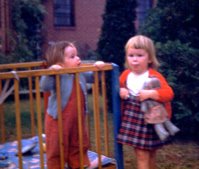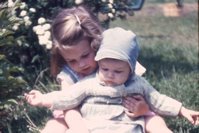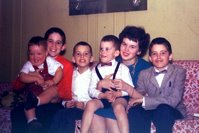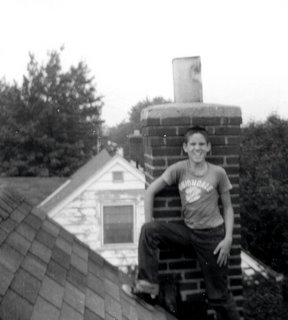This is from a graduate school paper on child development I wrote in 1977, when Anne was 4 and Michelle was 2. Michelle is younger in this photo.
I am still realizing to what extent the mother I am is shaped by the child I am mothering. When I had only one child, I congratulated myself for all of Anne's superior qualities and blamed myself for her troublesome ones. Since I've had 2 children, I've become remarkably more tolerant of other mothers and of myself. I've also grown to understand why my my mom, after mothering 6 kids, has always been quite skeptical of childrearing theories.
Since I belong to a unique Chelsea community where young parents support each other through babysitting cooperatives, cooperative playgroups and nursery schools, and mothers' support groups, I've had the chance to observe many children of similar ages interact with their parents. When I first moved here when Anne was 17 months, I was quick to correlate the children's characteristics with their parents' childrearing practices. Now I am humbly aware of how infinitely complex the whole question is.
The only dramatic change in our lives beween Anne's and Michelle's births was our move to Chelsea from the Upper West Side. We still lived on a high floor in an apartment with a terrace and spectacular views. Although I was still at home full-time and their dad was gone from 8 to 6, their day-to-day routine was completely different. When Anne was born, none of my NYC friends had children; consequently no one I knew was home during the day. To relieve my isolation, I frequently visited my parents and my husband's parents on Long Island. As a result, Anne had frequent contact with her grandparents and her teenage aunts and uncles, but very little contact with other babies and toddlers.
When Michelle was born, I was immersed in Anne's playgroup, with daily contact with 10 familes and their 2-year-olds. Monday to Friday Michelle was constantly exposed to the stimulation-bedlam of young kids. In fact playing with baby Michelle was playgroup's surefire activity when all else failed. On the other hand, I seldom visited Long Island; our parents and sibs came to visit us. Michelle's comings and goings are always tied to Anne's schedules.
In addition to having different daily routines, they had a different mother. After Anne's birth, I still did some free-lance editing. I kept wrestling with combining motherhood with my editing career. I almost accepted a 20-hour a week editing job when Anne was 9 months. By the time Michelle was born, I had wholeheartedly renounced publishing and was fully committed to full-time motherhood when my children were small. I had chosen working with young children and their parents as my future career. My expectations for myself and my baby had been transformed by what I experienced and by how I had grown during Anne's infancy. I was far freer to respond to my emotions and intuitions about Michelle. I had gained confidence in my own style of mothering and was no longer so swayed by "expert" opinion or my prior expectations of what kind of mother I should be. I was much more relaxed about introducing solids, long-term nursing, the family bed.
Michelle's relationship with me was hardly as symbiotic as my relationship with Anne during infancy. Anne was as much as part of Michelle's life as my husband and I were. Unless Anne was asleep, she was almost always in the same room when I nursed or played with Michelle. As soon as Michelle could reliably sit up, we bathed them together. Since Michelle was 8 months old, they've amicably shared the same room. I successfully diminished Anne's jealousy by involving her in every way possible in Michelle's care. I always read to Anne when I was nursing Michelle, since she hated playing in her bedroom by herself.
The result? Michelle's social skills seem far more sophisticated than Anne's were at 2. Sometimes she stays at Anne's cooperative nursery school when I am the helping mommy. She knows all the children's names, interacts warmly with them, participates fully in painting, block building, clay, water play, and dress up. She manages surprisingly well at meeting time and story time. She needs to establish eye contact with me fairly often, but she leaves me free to interact with the other children. At home she holds her own with her high-powered sister very well. As I observe her avoiding no-win confrontations with Anne, I try to imitate her skillful mixture of unmistakable self-assertion and judicious compromise. As Michelle chortles, "even Anne loves me."










